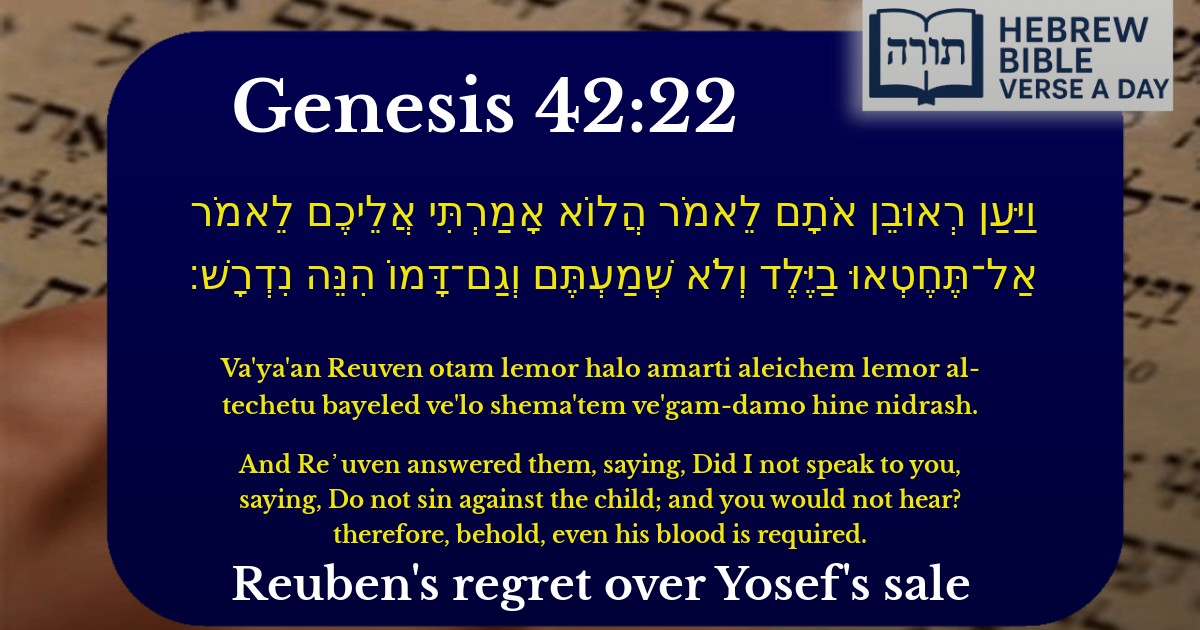Join Our Newsletter To Be Informed When New Videos Are Posted
Join the thousands of fellow Studends who rely on our videos to learn how to read the bible in Hebrew for free!
Hebrew Text
וַיַּעַן רְאוּבֵן אֹתָם לֵאמֹר הֲלוֹא אָמַרְתִּי אֲלֵיכֶם לֵאמֹר אַל־תֶּחֶטְאוּ בַיֶּלֶד וְלֹא שְׁמַעְתֶּם וְגַם־דָּמוֹ הִנֵּה נִדְרָשׁ׃
English Translation
And Re᾽uven answered them, saying, Did I not speak to you, saying, Do not sin against the child; and you would not hear? therefore, behold, even his blood is required.
Transliteration
Va'ya'an Reuven otam lemor halo amarti aleichem lemor al-techetu bayeled ve'lo shema'tem ve'gam-damo hine nidrash.
Hebrew Leining Text
וַיַּ֩עַן֩ רְאוּבֵ֨ן אֹתָ֜ם לֵאמֹ֗ר הֲלוֹא֩ אָמַ֨רְתִּי אֲלֵיכֶ֧ם <small>׀</small> לֵאמֹ֛ר אַל־תֶּחֶטְא֥וּ בַיֶּ֖לֶד וְלֹ֣א שְׁמַעְתֶּ֑ם וְגַם־דָּמ֖וֹ הִנֵּ֥ה נִדְרָֽשׁ׃
וַיַּ֩עַן֩ רְאוּבֵ֨ן אֹתָ֜ם לֵאמֹ֗ר הֲלוֹא֩ אָמַ֨רְתִּי אֲלֵיכֶ֧ם ׀ לֵאמֹ֛ר אַל־תֶּחֶטְא֥וּ בַיֶּ֖לֶד וְלֹ֣א שְׁמַעְתֶּ֑ם וְגַם־דָּמ֖וֹ הִנֵּ֥ה נִדְרָֽשׁ׃
🎵 Listen to leining
Parasha Commentary
📚 Talmud Citations
This verse is quoted in the Talmud.
📖 Shabbat 55b
The verse is referenced in a discussion about the consequences of sin and the concept of divine retribution, illustrating how Reuben's warning to his brothers about sinning against Joseph was ignored.
📖 Sanhedrin 6b
Cited in a broader discussion about justice and the moral responsibility of individuals, highlighting Reuben's attempt to prevent his brothers from harming Joseph.


Reuven's Rebuke to His Brothers
The verse (Bereshit 42:22) records Reuven's sharp rebuke to his brothers when they faced distress in Egypt, reminding them of their earlier sin against Yosef. Reuven emphasizes his prior warning: "Did I not speak to you, saying, 'Do not sin against the child'", highlighting his attempt to prevent their wrongdoing.
Rashi's Explanation
Rashi explains that Reuven is referencing his earlier plea when the brothers plotted against Yosef (Bereshit 37:21-22). Reuven had advised them not to kill Yosef but to cast him into a pit instead, intending to later rescue him. Here, Reuven reminds them that they ignored his warning, leading to Yosef's suffering and their current predicament. Rashi notes that "his blood is required" implies divine justice—their distress in Egypt is a consequence of their actions against Yosef.
Midrashic Insights
Rambam on Repentance
Rambam (Hilchot Teshuva 1:1) teaches that true repentance requires acknowledging past sins. Reuven's rebuke serves as a catalyst for the brothers to recognize their wrongdoing, setting the stage for their eventual reconciliation with Yosef and their collective teshuvah.
Theological Implications
The phrase "his blood is required" (דָּמוֹ הִנֵּה נִדְרָשׁ) echoes the principle of divine accountability found in Sefer Devarim (32:43) and Yechezkel (3:18), where Hashem exacts justice for innocent blood. The brothers now face the consequences of their actions, reinforcing the Torah's emphasis on moral responsibility.